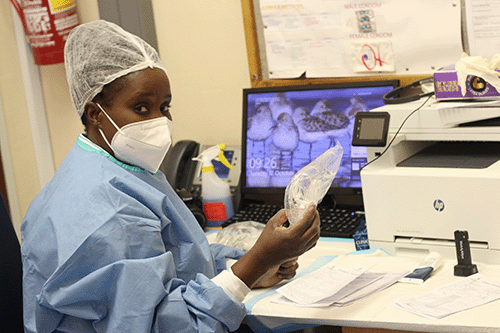Paheja Siririka
Registered nurse at the Namibia University of Science and Technology (NUST) clinic, Sister Kristine Siseho told Vital Signs that Namibian men should make it a habit to undergo breast cancer examinations as often as possible.
She highly recommends men to do self-examinations or to visit primary healthcare professionals for breast checks also. “Some men do develop lumps in their breasts, and it’s very hard for them to come for an examination unless there is a problem,” she noted.
Siseho recalled: “I recently saw a man who came to me, and he noticed that one his breasts was becoming larger, and I referred him to the theatre. If they develop into cancer cells, mastectomy (removal of the breast) can be done, or the removal of those abnormal tissues. If they develop into cancer, then chemotherapy will be necessary and surgery, if that is the case.”
According to the latest WHO data published in 2018, breast cancer deaths in Namibia reached 90 or 0.51% of total deaths. The age-adjusted death rate is 11.36 per 100 000 population, which ranks Namibia 140th in the world.
In the last decade, Namibia recorded more than 3 780 breast cancer cases, with men accounting for 99 breast cancer diagnoses. According to the Namibian cancer registry run by the Cancer Association of Namibia, published every five years, there have been 465 breast cancer cases recorded for 2019, but data is incomplete as they are still analysing it.
Male breast cancer, also known as male breast neoplasm, is a rare cancer in males that originates from the breast.
According to the Centres for Disease Control and Prevention (CDC), several men with breast cancer have inherited a BRCA mutation. But there are other causes, including alcohol use disorder, and exposure to certain hormones and ionising radiation.
A BRCA mutation occurs when the DNA that makes up the gene becomes damaged in some way. When a BRCA gene is mutated, it may no longer be effective at repairing broken DNA and helping to prevent breast cancer, and this leads to more chances of developing breast cancer.
The NUST clinic, which hosts papsmear and breast examinations several times yearly, says students have shown interest in having themselves tested for breast cancer.
“For breast examinations, we have seen about five students with abnormal lumps in the breasts, and we always refer them to the doctor for further diagnostics such as mammograms or biopsies to see if they are cancer cells or not,” shared Siseho.
She added that it is sometimes difficult to keep up with the students’ statuses since they only have limited periods at the university. But the current information is that they do not know of any student/s who have breast cancer, apart from the usual lumps they find, which are not cancerous.
“We advise that women, firstly, should do breast examinations of themselves in the shower (putting your arm over your head and randomly massaging the breast for lumps, and changing arms for the other breast), and if they observe any abnormalities, they shouldn’t hesitate to contact a nurse,” advised Siseho.
A NUST student who underwent a papsmear and breast examination urged Namibians to get examined to detect cancerous cells early. “It will be great to know your cancer status, so I urge everyone to have themselves checked. If detected early, there is a greater chance of stopping it early or finding ways to treat it,” she said.
Belinda Mthombeni, the SRC for gender, health and development, said such interventions by higher education institutions are imperative as early detection can save lives. “We extended the invitation to Unam and IUM since they don’t offer such facilities at their campuses. We need to spread more awareness on the importance of having these examinations done,” added Mthombeni.
She observed that many students are afraid of knowing their cancer statuses, but that shouldn’t deter them from doing the right thing and getting examined. She said: “There is that fear of the unknown, plus the fear of dying. But it is okay to come, have yourself checked, and raise awareness because you never know how you can be assisted.”


